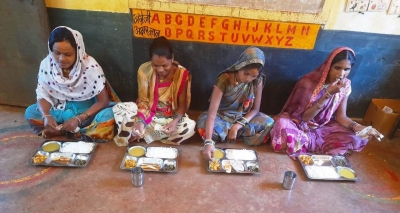India’s study on nutritional impact on TB outcomes contributed to global guidance: WHO
By IANS | Updated: August 6, 2025 12:14 IST2025-08-06T12:09:32+5:302025-08-06T12:14:55+5:30
New Delhi, Aug 6 The study undertaken by India that showed the positive impact of nutrition on the ...

India’s study on nutritional impact on TB outcomes contributed to global guidance: WHO
New Delhi, Aug 6 The study undertaken by India that showed the positive impact of nutrition on the outcome of tuberculosis (TB) contributed to global guidance on the world's most infectious disease, said the World Health Organization (WHO), while calling for more research and innovation to fight TB.
Led by ICMR, the study conducted in Jharkhand, offered the first evidence that providing extra nutrition is effective in preventing TB cases and mortality in India.
"The findings from India’s RATIONS study on the impact of nutrition on TB outcomes and incidence of the disease have contributed to the global guidance," said the WHO, during a three-day virtual workshop.
The WHO also urged the South-East Asia region -- accounting for the highest share of cases and deaths worldwide -- to urgently scale up research and innovation to achieve the End TB goals.
“In our Region alone, nearly 5 million people developed TB and close to 600,000 died from the disease in 2023,” said Dr Catharina Boehme, Officer-in-Charge, WHO South-East Asia Region.
“Achieving the ambitious targets in the WHO End TB Strategy requires collaboration to accelerate research and innovation. It requires the adoption and use of new tools, technologies, and drugs. Ensuring timely and equitable access to these innovations remains critical to achieving impacts at scale, leaving no one behind,” she added.
The WHO noted that the South-East Asia Region has made notable progress, including an increase in TB case notifications in 2023, which signalled recovery after Covid-19-related setbacks.
Yet, progress remains insufficient to meet the End TB Strategy targets.
Post-Covid-19 pandemic, TB once again reemerged as the world’s leading cause of death from a single infectious agent, the WHO said. It places a disproportionate burden on the poorest and most vulnerable, further exacerbating inequalities.
To counter this, “countries in the Region are increasingly leveraging new approaches such as artificial intelligence for case detection, computer-aided diagnostics, digital adherence tools, and direct benefit transfers for patients, streamlining the social support process,” the WHO said.
Several countries are also undertaking important research, including epidemiological research to assess the disease burden.
However, uptake of research outcomes remains uneven due to knowledge gaps and limited platforms for knowledge exchange and collaborative use.
“Our progress is uneven. Research and innovation capacity is varied across the Region, and the results of these efforts are often siloed and unavailable for collaborative use. The rise in drug-resistant forms of TB remains very concerning,” said Boehme.
Boehme stressed "the need to ensure equitable access to the benefits of research and innovation, including vaccines, medicines, and diagnostics.”
Disclaimer: This post has been auto-published from an agency feed without any modifications to the text and has not been reviewed by an editor
Open in app